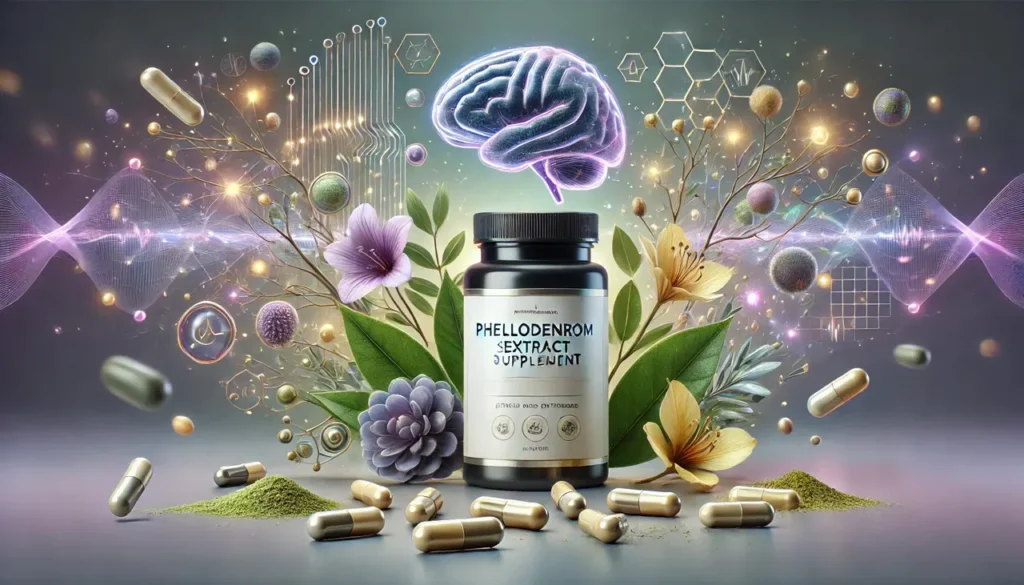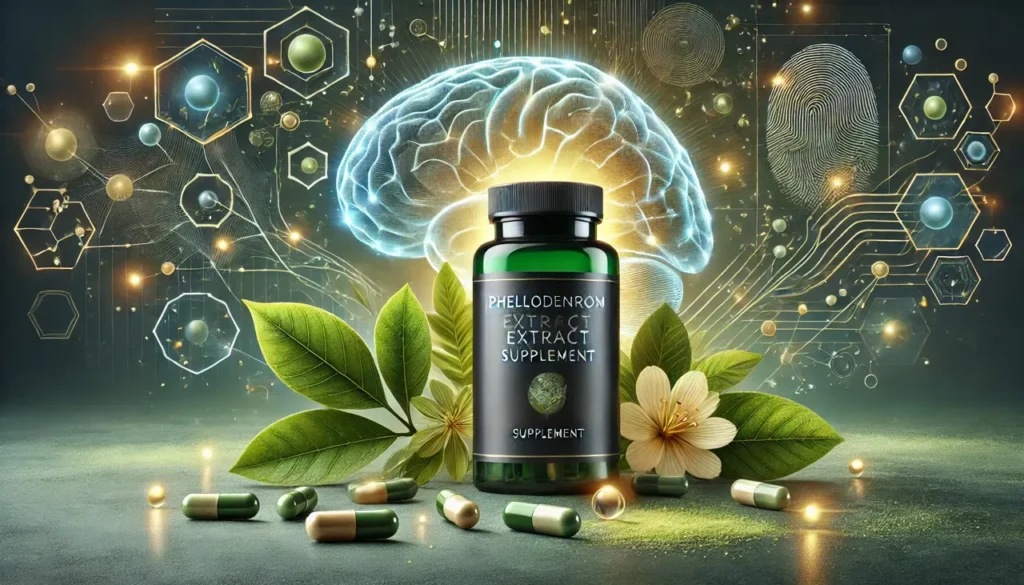Phellodendron, a deciduous tree species native to East Asia, has been a cornerstone of traditional Chinese and Japanese medicine for centuries. The extract, particularly derived from Phellodendron amurense (Amur cork tree), has gained attention in recent years for its potential benefits as a nootropic supplement. Known mainly for its use in treating inflammation, bacterial infections, and metabolic issues, Phellodendron may also offer cognitive support. This article explores the complex nature of Phellodendron, examining its chemical composition, physiological mechanisms, potential cognitive benefits, dosage guidelines, side effects, and possible interactions with other medications and supplements.
You May Also Like:
Sources of Phellodendron
Phellodendron is primarily sourced from the bark of the Amur cork tree, found predominantly in China, Korea, and Japan. This bark, known as Huang Bai in traditional Chinese medicine, is harvested and processed into powders, tinctures, and capsules. In addition to being available as a standalone supplement, Phellodendron is also a key ingredient in various traditional herbal formulations, like the popular blend, Xiao Yao San, which is often used to promote stress relief and mental calmness.
Common Forms of Phellodendron Supplementation:
- Capsules: Standardized extracts in capsule form offer controlled dosing, usually with berberine and other alkaloid content listed.
- Powders: Powdered bark or standardized powder extracts can be mixed into beverages or taken as part of herbal formulations.
- Tinctures: Liquid extracts that are often used for quicker absorption, though precise dosing may vary.
Relax Your Mind and Body for Better Sleep with High-Quality Supplements—Buy Today on Amazon!

Chemistry of Phellodendron
The active components in Phellodendron primarily include a group of alkaloids, among which berberine and palmatine are the most prominent. These alkaloids contribute to its physiological effects, with berberine receiving particular attention due to its broad-spectrum antimicrobial, anti-inflammatory, and neuroprotective properties. Berberine has been studied for its ability to cross the blood-brain barrier, thus influencing neural pathways directly.
- Berberine: A yellow, isoquinoline alkaloid that inhibits oxidative stress and modulates inflammatory cytokines in the brain, which may support cognitive health. Berberine also has an effect on glucose metabolism, which can contribute to stable energy levels essential for mental clarity.
- Palmatine: Similar to berberine, palmatine has anti-inflammatory and antioxidant properties and may modulate neurotransmitter activity, particularly in areas of the brain related to mood and cognition.
Other minor components, such as obacunone and limonin, are believed to exert additional anti-inflammatory and neuroprotective effects, though their impact on cognition specifically has not been as extensively researched.

Physiological Mechanism and Impact on Brain Health
Phellodendron’s effects on the brain appear to stem from its ability to reduce oxidative stress and inflammation, which are two major factors in cognitive decline. Berberine, in particular, demonstrates antioxidant activity by neutralizing free radicals and enhancing the body’s natural antioxidant defenses. Research has shown that berberine increases the activity of antioxidant enzymes, such as superoxide dismutase and glutathione peroxidase, both of which are crucial in protecting neurons from oxidative damage.
In addition, Phellodendron’s alkaloids interact with several neurotransmitter pathways, particularly those involving serotonin and dopamine. By influencing these pathways, Phellodendron may help regulate mood and emotional responses, offering a natural approach to managing stress and enhancing mental clarity. Phellodendron also has potential as an anti-glucocorticoid, as seen in animal studies that suggest it can reduce cortisol levels under stress, thus helping maintain cognitive performance and emotional stability in high-stress scenarios.
Promote Relaxation and Inner Peace with Expertly Formulated Stress Supplements—Buy Now on Amazon!

Potential Nootropic Benefits of Phellodendron
Phellodendron’s nootropic effects are an area of emerging interest, largely due to its anti-inflammatory, antioxidant, and adaptogenic properties. Here are some of the key cognitive and neuroprotective benefits associated with Phellodendron:
- Mood Enhancement and Stress Resilience
Through its impact on the hypothalamic-pituitary-adrenal (HPA) axis, Phellodendron may help regulate cortisol levels, which are often elevated in chronic stress. Lower cortisol levels can contribute to reduced anxiety and improved mood, making Phellodendron a potentially valuable supplement for individuals under prolonged stress. Its adaptogenic properties allow the body to better handle stress, fostering resilience and mental clarity. - Improved Cognitive Function and Memory
Phellodendron’s antioxidant properties protect the brain’s neural tissues from oxidative damage, which can otherwise impair memory and cognitive performance. The ability to support brain health at the cellular level may make Phellodendron a supportive agent for memory retention and overall cognitive clarity, especially in aging populations at risk of cognitive decline. - Anti-Inflammatory Neuroprotection
Chronic inflammation is linked to neurodegenerative diseases, including Alzheimer’s and Parkinson’s. The anti-inflammatory compounds in Phellodendron, particularly berberine, may reduce neuroinflammation, helping to safeguard cognitive health. Studies have shown that berberine inhibits the production of pro-inflammatory cytokines, thus potentially reducing inflammation in the brain and supporting long-term neurological health. - Enhanced Metabolic Health and Cognitive Impact
Phellodendron’s role in metabolic health indirectly benefits the brain. By regulating blood sugar levels, particularly in individuals at risk of insulin resistance, Phellodendron supports steady glucose delivery to the brain, which is essential for mental energy and focus. This metabolic support also reduces the risk of cognitive impairment linked to metabolic disorders like diabetes. - Neurotransmitter Support for Emotional Balance
The alkaloids in Phellodendron can influence serotonin and dopamine levels, aiding neurotransmitter balance that impacts mood and cognition. By modulating these pathways, Phellodendron may reduce symptoms of mood disorders, including mild depression and anxiety, while promoting a sense of calmness and cognitive steadiness. - Cognitive Clarity and Focus in Stressful Situations
Research suggests that Phellodendron’s adaptogenic qualities may improve cognitive clarity during periods of acute or prolonged stress. This effect could benefit students, professionals, or anyone experiencing cognitive demands under pressure, allowing for sustained focus without mental fatigue. - Sleep Support and Cognitive Recovery
Although not a primary sedative, Phellodendron’s cortisol-lowering effect may aid in restful sleep, indirectly supporting cognitive recovery. Quality sleep is essential for memory consolidation and cognitive performance, making Phellodendron’s role in stress management a beneficial factor for brain health.

Dosage Guidelines for Nootropic Use
As with any supplement, determining the correct dosage of Phellodendron is essential for maximizing benefits while minimizing risks. Dosages for Phellodendron can vary based on the specific extract used and individual health goals. For general cognitive support and stress management, typical dosages range from 200 to 500 mg per day of standardized Phellodendron bark extract. This range provides a sufficient concentration of berberine and other active compounds without excessive exposure to potential side effects.
Higher doses of berberine, which is often isolated from Phellodendron, are used in metabolic support studies at around 500 to 1,000 mg per day, usually divided into multiple doses. However, for nootropic use, it is generally recommended to keep dosages moderate, as berberine can cause gastrointestinal upset in higher amounts.
Best Practices for Dosing:
- Start with Lower Doses: Begin with 200 mg per day to assess tolerance, gradually increasing to 400–500 mg as needed.
- Divide the Dose: If taking higher doses, dividing them between morning and evening may help avoid digestive issues and optimize absorption.
- Cycle the Supplement: To avoid tolerance, consider a cycle of three weeks on followed by one week off.

Side Effects and Safety Considerations
Phellodendron is generally well-tolerated when taken at moderate doses, but some individuals may experience side effects, particularly with prolonged or high-dose use. Reported side effects primarily include gastrointestinal symptoms such as nausea, diarrhea, and mild stomach discomfort. These effects are more common at higher doses of berberine, a key active compound in Phellodendron.
Additionally, Phellodendron may lower blood pressure, so individuals with hypotension should use caution. Pregnant and breastfeeding women should avoid Phellodendron supplementation due to a lack of research on safety during these stages.
Interactions with Other Supplements and Medications
Phellodendron has the potential to interact with various medications and supplements. Notable interactions include:
- Antidiabetic Medications: Berberine can lower blood glucose levels, which may potentiate the effects of antidiabetic drugs such as insulin and metformin. Close monitoring of blood sugar levels is recommended for individuals taking both Phellodendron and antidiabetic medications to avoid hypoglycemia.
- Antihypertensive Medications: Due to its blood pressure-lowering properties, Phellodendron may enhance the effects of antihypertensive drugs. This combination could potentially cause blood pressure to fall too low, leading to dizziness or fainting.
- Anticoagulants and Antiplatelet Drugs: Phellodendron may possess mild anticoagulant properties, which could enhance the effects of blood-thinning medications, such as warfarin. Individuals on these medications should consult with a healthcare provider before beginning supplementation to avoid bleeding risks.
- CYP3A4 Enzyme Modulators: Phellodendron and berberine may interact with drugs that are metabolized by the liver enzyme CYP3A4, potentially affecting the plasma levels of these medications. This interaction is particularly relevant for medications with narrow therapeutic windows.
Risks for Individuals with Specific Health Conditions
While Phellodendron can offer cognitive and stress-related benefits, certain individuals should use caution:
- Liver and Kidney Disease: Given that berberine is metabolized by the liver and excreted by the kidneys, individuals with compromised liver or kidney function should avoid high doses of Phellodendron without medical supervision.
- Digestive Disorders: Phellodendron may aggravate symptoms in individuals with gastrointestinal sensitivities, such as irritable bowel syndrome (IBS) or inflammatory bowel disease (IBD), especially in higher doses.
- Autoimmune Conditions: Phellodendron has immunomodulatory effects, which could potentially influence autoimmune conditions. Individuals with autoimmune diseases should consult their physician before beginning supplementation.
Promote Memory and Mental Resilience with High-Quality Panax Ginseng—Order Today on Amazon!

Conclusion
Phellodendron presents a compelling profile as a nootropic supplement, offering antioxidant, anti-inflammatory, and adaptogenic effects that may support mood, cognitive function, and neuroprotection. The plant’s bioactive compounds, particularly berberine, contribute to its potential benefits for mental clarity, emotional resilience, and memory enhancement. While Phellodendron is generally safe when taken within recommended dosages, individuals with underlying health conditions or those on specific medications should consult with a healthcare provider before incorporating it into their regimen.
The potential interactions with medications, particularly antidiabetic and antihypertensive drugs, highlight the importance of personalized guidance when using Phellodendron. With further research, Phellodendron may become a more widely recognized nootropic, adding to the growing landscape of plant-based cognitive enhancers. As with all supplements, responsible use is key to maximizing its benefits while safeguarding overall health.

References:
- Phellodendron – An Overview. Retrieved from: https://www.sciencedirect.com/topics/medicine-and-dentistry/phellodendron
- Phellodendron amurense bark extract. Retrieved from: https://www.cancer.gov/publications/dictionaries/cancer-drug/def/phellodendron-amurense-bark-extract
- Phellodendron and Citrus extracts benefit joint health in osteoarthritis patients: a pilot, double-blind, placebo-controlled study. Retrieved from: https://nutritionj.biomedcentral.com/articles/10.1186/1475-2891-8-38
- Dietary Administration of Berberine or Phellodendron amurense Extract Inhibits Cell Cycle Progression and Lung Tumorigenesis. Retrieved from: https://pmc.ncbi.nlm.nih.gov/articles/PMC6004604/
Important Note: The information contained in this article is for general informational purposes only, and should not be construed as health or medical advice, nor is it intended to diagnose, prevent, treat, or cure any disease or health condition. Before embarking on any diet, fitness regimen, or program of nutritional supplementation, it is advisable to consult your healthcare professional in order to determine its safety and probable efficacy in terms of your individual state of health.
Regarding Nutritional Supplements Or Other Non-Prescription Health Products: If any nutritional supplements or other non-prescription health products are mentioned in the foregoing article, any claims or statements made about them have not been evaluated by the U.S. Food and Drug Administration, and such nutritional supplements or other health products are not intended to diagnose, treat, cure, or prevent any disease.


